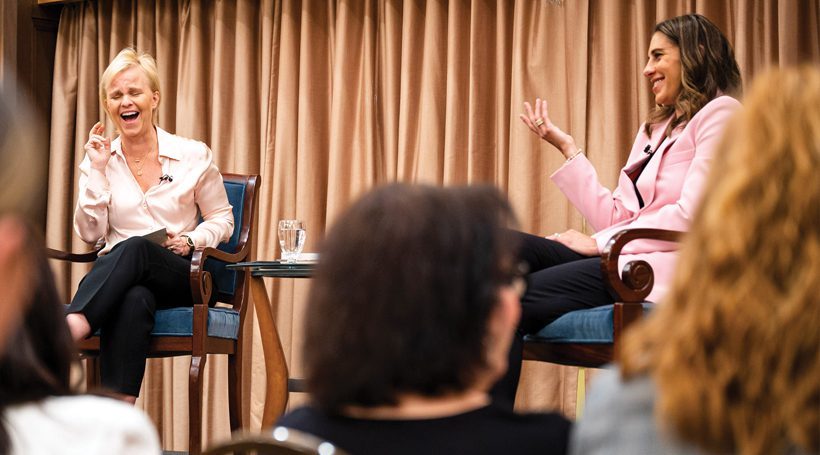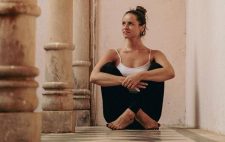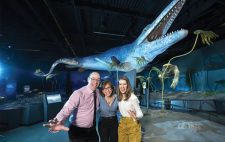Earlier this year, SJ Mag hosted a very special event, where Marianne Aleardi sat down with soccer superstar Carli Lloyd to talk about power and passion. Almost 300 people listened to Carli describe her latest adventure: winning FOX’s new reality show “Special Forces: World’s Toughest Test” (with some soccer talk sprinkled in, of course). Carli shared her experiences channeling mental toughness in the Jordan desert with fellow celebrities, as they completed challenges usually reserved for U.S. special forces candidates. Her stories were both brutal and heartwarming, funny and jaw-dropping – and some we wouldn’t have believed if there weren’t cameras filming the contestants 24/7. Check out some highlights from the talk.
On what they were allowed to pack…
“They allowed us to have 3 bras, 3 pairs of underwear. You could bring some electrolytes. Some things had to get approved, like medication. I think Hannah Brown ended up sneaking in a mirror. I had ear plugs and that was about it. Kate from Kate Plus 8, she had like 6 bags. We’re like, How did you get all of these things approved? And she didn’t even last a day! When you’re off the show, everybody rummages through the boxes. It’s like oh, what can we take from these?”
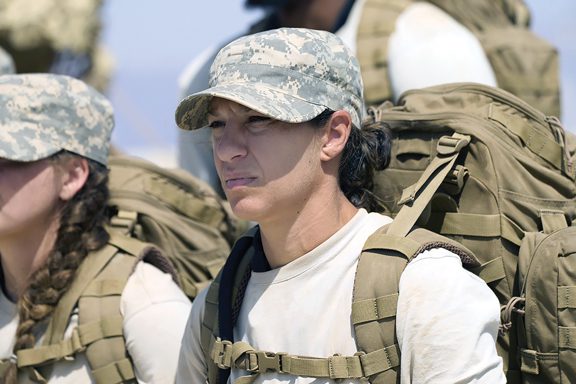
On the production…
“We were filmed 24/7. We never saw production. They never talked to us. They never gave us coffee or any requests. The only people we could speak to were the directing staff guys. You quickly forgot you were on TV and there were cameras around. I think I was told there were probably 50-some cameras that were hidden around the base camp, and then when we went out to do challenges, there were obviously a couple of main cameras, but there wasn’t a huge production crew. They had shifts of I think 3 people who were basically staying up in the middle of the night, watching us sleep, which sounds so creepy.”

On her most difficult challenge…
“Besides the ending – the interrogation – I would probably say for me the biggest challenge was the Jeep. There was a crane which had a Jeep attached to it, and you were supposed to get into the Jeep, have your hands on the wheel, and you’re buckled in. There is no glass window on the driver’s side and there is no glass window on the back of the Jeep. Then they plunge you into the water. It’s not a very graceful plunge, so it hits the water and there are a lot of bubbles. You can’t really see. As I’m going in there, I’m just telling myself to take a deep breath. I shut my eyes, and then when I opened my eyes, all I could see was the water just churning. I panicked, clearly, took my hands off the wheel and was reaching for one of the director staff’s receiver to get some air. He actually allowed me to calm down in that particular moment. He allowed me to, like, hit the reset button. I ended up feeling like I could continue to hold my breath, and then I eventually executed it. I don’t know what triggered me to panic and freak out, but it was pretty amazing that he didn’t allow me to quit in that particular instant.”
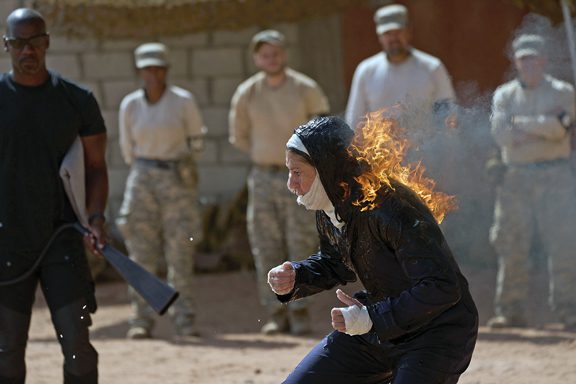
On being set on fire…
“I actually liked that one. We had to take off all our clothes and put this wetsuit on, then we had to put another layer on, then the goop. It was a lot, I guess it was like ultrasound gel. And then, they’re basically lighting you on fire. I didn’t feel it that much. I think I sprinted pretty quickly and hit the ground. They told me I hit the ground a little harder than I should, because obviously you don’t want to break a bone in that particular instance, but that one wasn’t that bad. I didn’t mind that.”
On the time she called someone out…
“That day in particular with Mooch [former White House Press Secretary Anthony Scaramucci], he wanted to take a water break when we’re getting shot at and trying to push the Jeep across the safe zone. So when you say let’s take a water break twice, it doesn’t go over so well. So we all laughed at him. But you know what, we got back into the tent and he said, Look, I’m sorry, guys. I own up to it, and it was like everything was just settled then and there. It didn’t linger. It brought us closer. It was a really unique, special bond we had.”
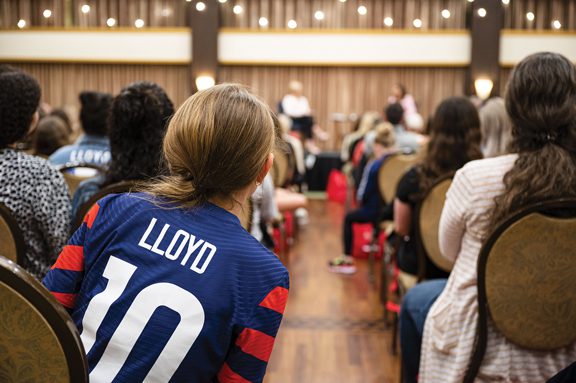
Photo: David Michael Howarth
On writing a goodbye letter to her family…
“All of the directing staff guys have to write letters when they go away, because sometimes they don’t make it home. So they made us all write letters. We went off on our own into the camp and wrote, but we weren’t told we were going to have to read the letters out loud. At that moment, that’s when you really become vulnerable. You’re basically sharing pretty deep thoughts with people you don’t know. That was a huge turning point in our group. The producers, everybody at FOX, the DS’s, they all told us after the show that they started calling us the wolfpack after we read those letters. The Special Forces is all about a small group where everybody is good at something different, and it’s about using that person’s strength. At that moment we formed a very deep bond with one another. It was very emotional.”
On the finale…
“The stressed positions were probably the hardest. It was either standing with your arms up against the wall or laying down and your ankle bones have to touch. You don’t realize how hard that is. I had hurt my knee on day 3, so thankfully my knee was intact or else I was potentially going to have to voluntarily withdraw. But I was told I was falling asleep standing up. They didn’t show that part. The annoying voices in the headphones – it was like a baby crying and an animal screeching. It was the most annoying, crazy sounds, but I just kind of went to a happy place, knowing I was almost done. We were in that box for 11 hours. But there was a mirror where the producers and the doctor were watching through to make sure we were all okay.”
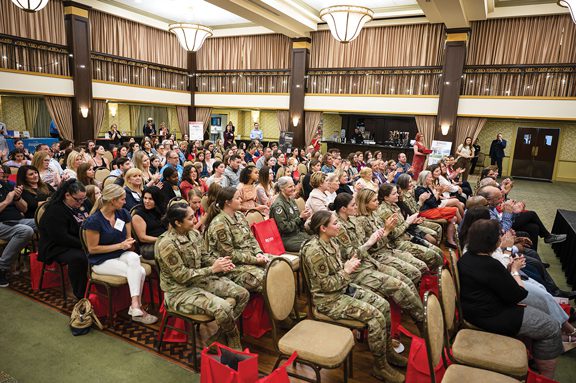
Photo: David Michael Howarth
On whether she’d do the show again…
“I don’t regret it. It was an amazing, once-in-a-lifetime moment. I think I would maybe want to see if I could be better at some of those tasks by doing them again.”
On why she retired from soccer…
“The way our national team cycles work, it’s every 4 years. So every 4 years, there’s a World Cup, followed by an Olympics. Those 4 years keep cycling over and over again. I started out with my first World Cup in 2007 and my first Olympics in 2008, so that was sort of phase 1. I knew I wanted to do 4 cycles. That brought me to the age of 39 during Covid, and I knew I wasn’t going to go a whole other cycle and try for another World Cup. I also didn’t want the coach to force me out, so I thought it was very fitting to announce my retirement. So I had a couple months, a little farewell tour, where I got to enjoy the fans. I got to take in everything, the posters, all of it. It was time to just live life, time to go skiing, time to ride a 4-wheeler and spend time with my husband, family and friends.”
On working out post-retirement…
“I don’t work out every day, but I still try to stay active. It’s very different. It’s hard. I’m kind of a normal human being now. I get the struggle, I really do.”
On the fight for equal pay…
“It was a long, hard-fought battle. 6 years. We had to deal with all sorts of conference calls, contracts, meetings, you name it, and then we had to put our jersey on and go out onto the field, play, compete and try to win. But it was no different than what all the ’99ers had done when I first got on the team in 2005. They were just negotiating their new collective bargaining agreement, which was essentially their contract with the national team. They were fighting for guaranteed contracts, pregnancy leave, health insurance, all types of things. I had just come onto the scene. I played 2 games that year, got a paycheck and thought I was rich and that this was great. But I didn’t know what they were fighting for and the meaning of that. When I became a little older and more of a veteran player, we started to realize that we were just being told to be happy for what we were given. Then we started to see the disparity between men and women. We weren’t fighting against the men, we were trying to fight for what was right. I still think there’s a lot more that can be made better, but we made some strides that are important for the next generation. The whole goal was to leave the sport better than when I first came into it.”
On all her accomplishments…
“I think it’s hard to pick one, because without some of those tough challenging moments, without the heartbreak, it wouldn’t be a complete journey. My journey was really hard. No one pegged me as the next best thing. In fact, I’m sure there were a lot of people who didn’t really want to see me succeed or see me make it as far as I did. But I always stayed true to myself. I always respected every single person I played with. It was one of those things where it was hard to see what the ending would end up being like, but it was probably the best ending I could have ever asked for.”


